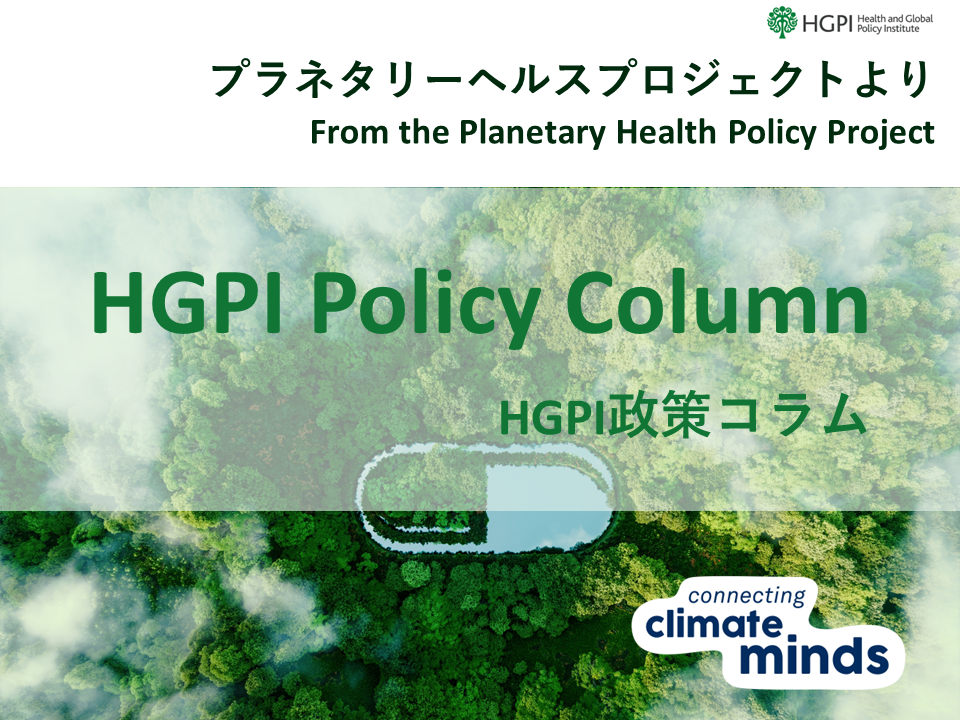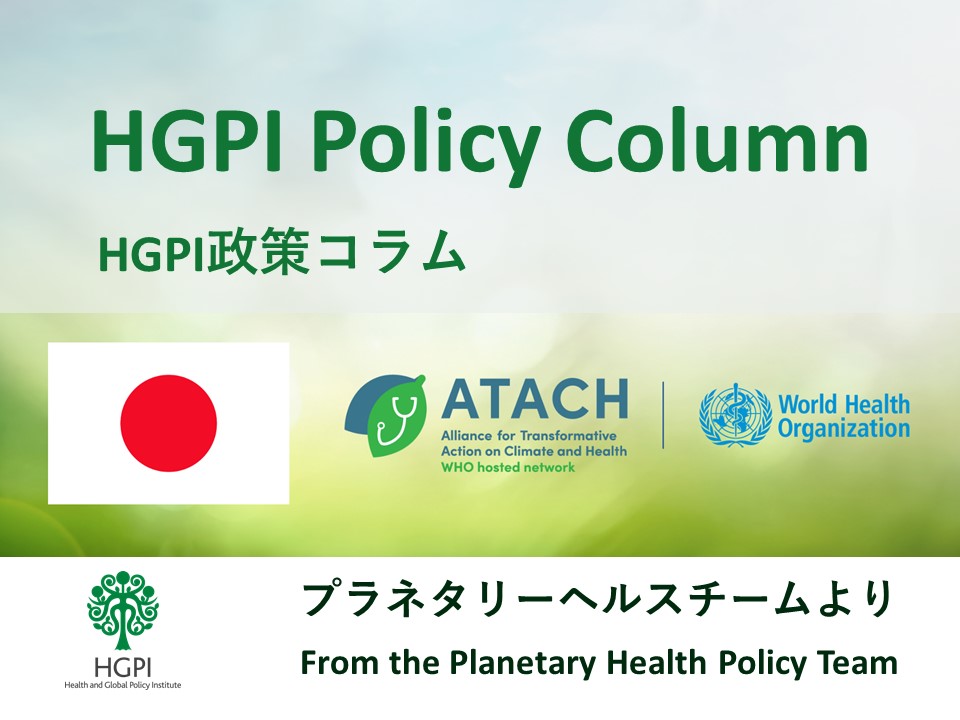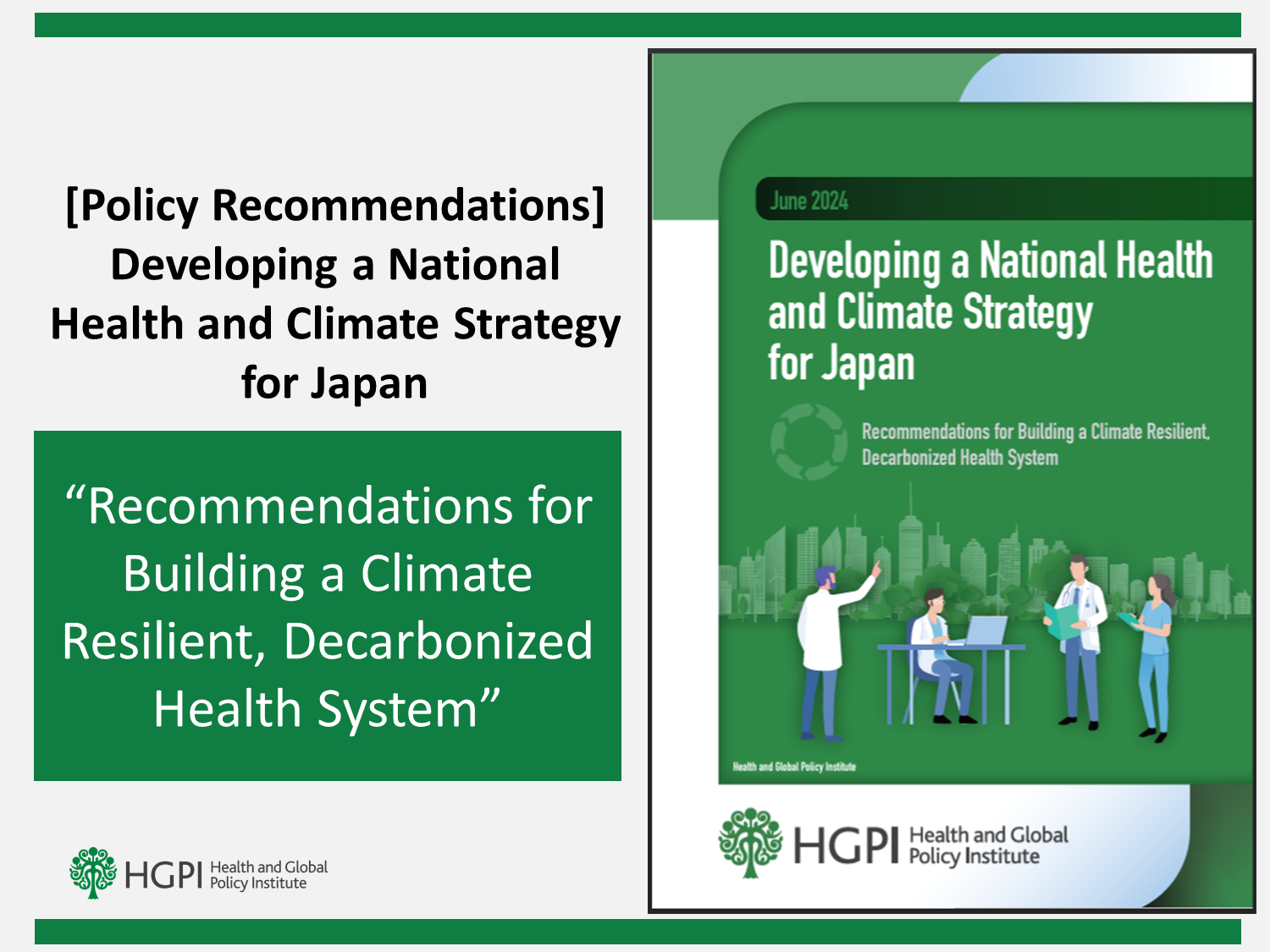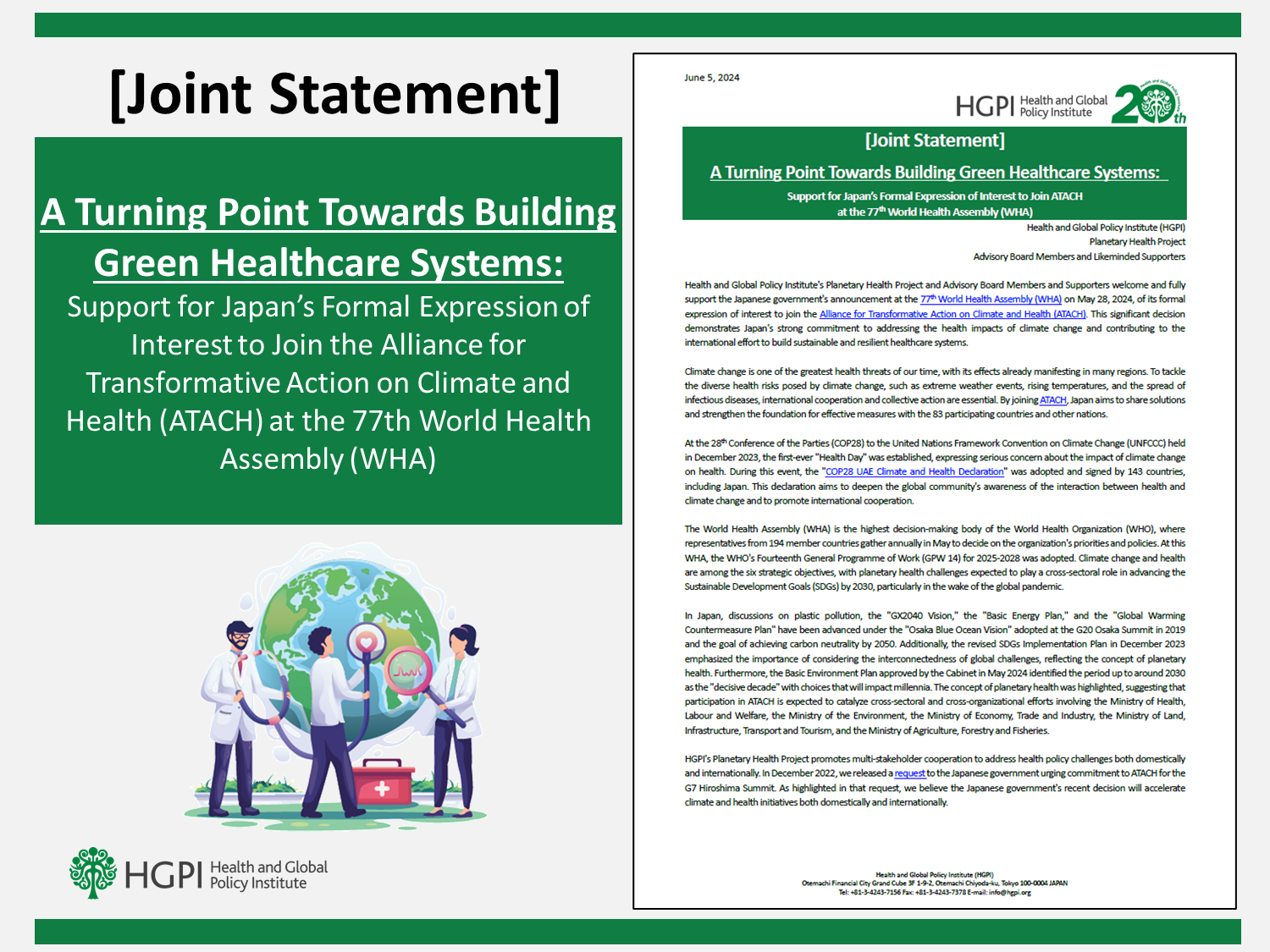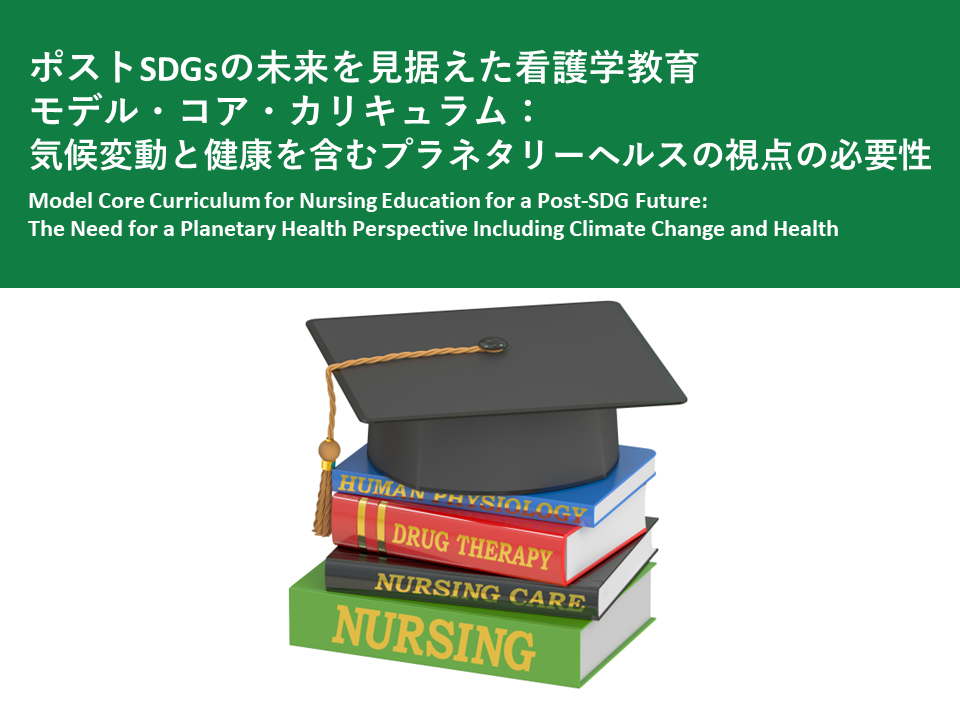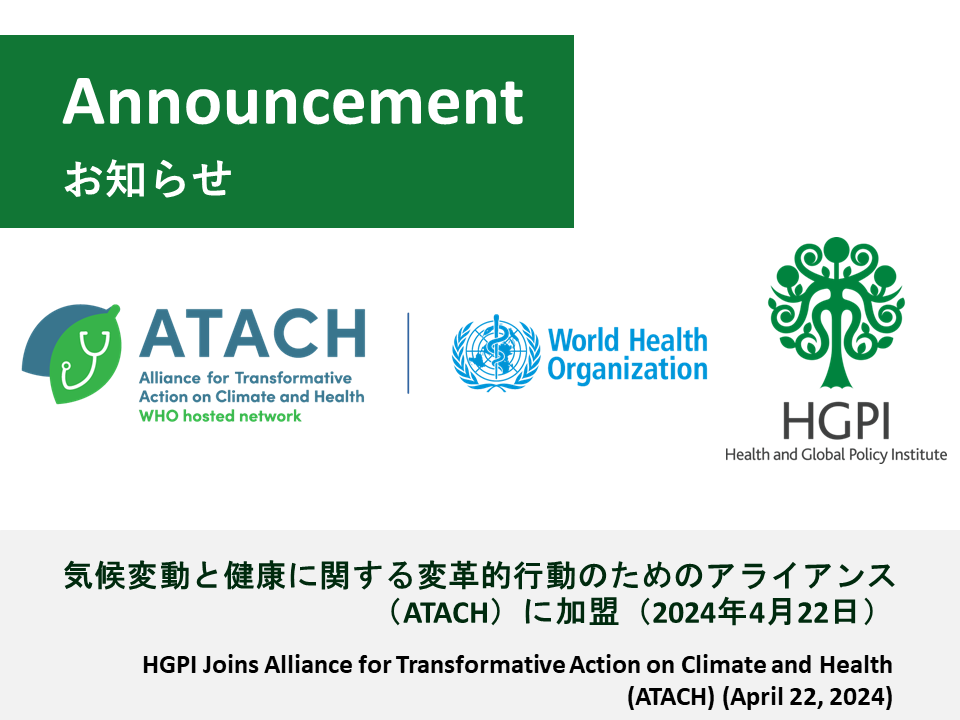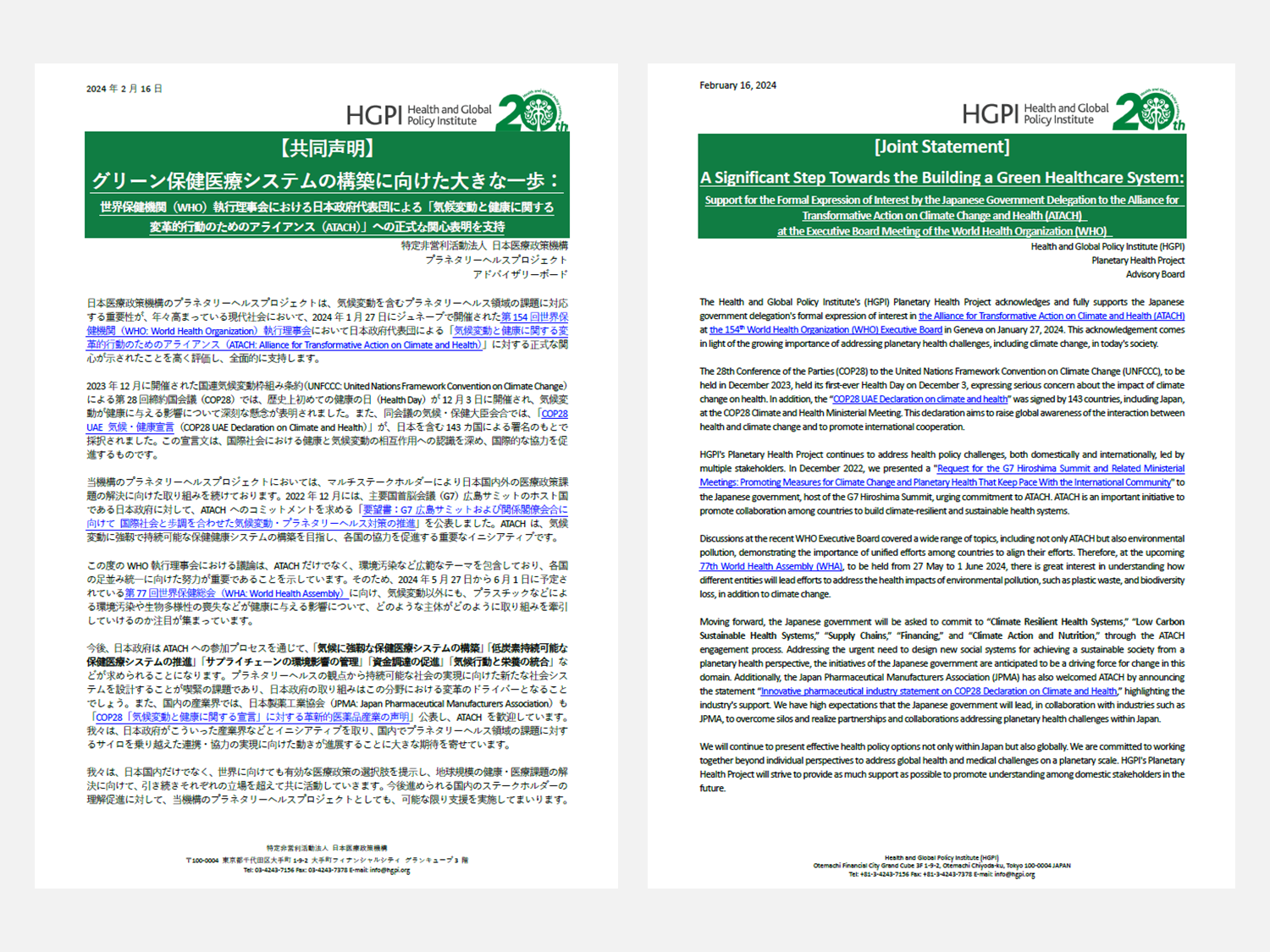[HGPI Policy Column] (No.47) From the Planetary Health Project “Part 10: ATACH Support System and Global Framework for Achieving Sustainable Health Care Systems”
date : 8/27/2024
![[HGPI Policy Column] (No.47) From the Planetary Health Project “Part 10: ATACH Support System and Global Framework for Achieving Sustainable Health Care Systems”](https://hgpi.org/en/wp-content/uploads/sites/2/HGPI_20240822_HGPIColumnATACH2.png)
<POINTS>
- The ATACH Community of Practice (CoP) is responsible for helping countries achieve their commitments to build a climate resilient and low carbon sustainable health systems
- ATACH Partners contribute to this goal through participating in working groups that identify regional challenges and develop working plans
- ATACH Partners work directly with and support countries that have made ATACH commitments to achieve their goals in countries that are familiar with
- With the Japanese government joining ATACH, Japanese institutions and organizations will join ATACH Partners and it will be important to support Japan in achieving its commitments
Introduction
The previous column on the Alliance for Transformative Action on Climate and Health (ATACH) outlined the process that led to the establishment of ATACH and the commitments made by countries. The previous column focused specifically on the role of ATACH for countries that have made commitments to build climate-resilient and sustainable health systems. ATACH is an international effort to support countries that have made these commitments, involving a wide range of stakeholders. Health and Global Policy Institute (HGPI) is the first Japanese organization to officially join ATACH as a partner in April 2024.
This column will focus on the functions of ATACH as the organization responsible for supporting these commitments and the partners and working groups, such as non-profit organizations, that make up the ATACH community of practice.
ATACH Missions
ATACH has four key objectives.
- Support Member States to develop health systems which are resilient to the impacts of climate change and are low carbon and sustainable, contributing to national net zero goals.
- Encourage Member States to make commitments on ‘climate resilient and sustainable’ health systems and to build on those commitments for increased ambition.
- Elevate the climate and health agenda in both climate and health spaces by identifying and advocating for innovative solutions to global constraints thereby achieving resilient and sustainable systems.
- Identify, disseminate, strengthen, and advocate for evidence and knowledge on best practices relating to emerging issues and the health argument for climate change to support implementation of the commitments and encourage global progress in addressing the climate and health nexus.
To achieve these objectives, there are five functions for ATACH: 1) Deliver an international shift on priority issues through the collective power of Member States and other stakeholders; 2) Monitor country level progress against the commitments made; 3) Develop quality assurance mechanisms designed ensure that assessments, plans, and implementation are of the quality required to deliver on commitments made; 4) Finance. Identify financing needs, and support Member State access to finance, including climate finance, in a timely and sustainable way; 5) Support knowledge sharing and coordinate access to technical assistance. This includes sharing of expertise, knowledge and experience on the assessment, planning, implementation, financing, and monitoring of commitments.
Working Group
The following five working groups have been formed to achieve the goals of ATACH. Each working group has set its own goals and has developed work plans to achieve these goals and to support countries in meeting their commitments.
- Financing Working Group (FIN-WG)
FIN-WG aims to enhance the collective efforts of WHO Member States and key stakeholders to facilitate access to sustainable finance and resource mobilization, with a view to scaling up investments in climate and health.
- Climate Resilient Health Systems Working Group (CRHS-WG)
CRHS-WG has a specific focus on building climate resilience and adaptation to present, emerging and future health impacts and threats of climate change.
- Low Carbon Sustainable Health Systems Working Group (LCSHS-WG)
LCSHS-WG has a specific focus on mitigating and building climate resilience and adaptation to present, emerging and future health impacts and threats of climate change.
- Supply Chain Working Group (SC-WG)
SC-WG has a specific focus on emission reduction in the supply chain and to seek and promote solutions and collaborative action in order to ensure clean, green and sustainable health systems.
- Climate Action and Nutrition Working Group (I-CAN-WG)
I-CAN-WG focuses on the intersection of climate change and nutrition, and strives to help foster collaboration to accelerate transformative action to address the critical nexus of climate change and nutrition.
ATACH Community of Practice
ATACH community is organized into a Community of Practice (CoP) that provides technical assistance, learning networks, and platforms for program countries to build climate resilient and sustainable health systems. The CoP includes countries and areas associated with ATACH, partners, resource repositories, and the First Wins Library.
ATACH associated countries and areas are those that have made ATACH commitments (also known as “COP26 Health commitments”). At the 77th World Health Assembly (WHA), Japan and Senegal committed to participate in ATACH, and as of June 26, 2024, a total of 84 countries are included.
ATACH partners include non-governmental organizations, international business associations, philanthropic foundations, and academic institutions, and the CoP serves as a catalyst for connections between countries committed to fulfilling their commitments and the expertise offered by ATACH partners.
Resource repository aims to provide easy access to resources such as funding opportunities, discussion papers, guidance documents, training, country experiences, and tools that can directly support the implementation of the ATACH commitments.
First Wins Library is a collection of case studies designed to provide concrete examples of interventions that can be implemented in health systems to move towards climate resilience and low carbon sustainability. It highlights successful country experiences and provides practical guidance.
The following four actors and resources are part of the CoP.
Support Provided by Partners
In order to promote the implementation of the COP26 Health Program commitments, the ATACH website introduces each partner, the commitments they can support, and the country experience of the partner, in order to foster connections among community members, participating countries, and partners.
ATACH baselines, which was mentioned in the previous column, already lists organizations that have provided support in efforts to achieve the commitments.
There are six commitments that can be supported.
- Conduct climate change and health vulnerability and adaptation assessments (V&As) at population level and/or health care facility level.
- Develop a health national adaptation plan (HNAP) informed by the health V&A, which forms part of the National Adaptation Plan.
- Use the V&A and HNAP to facilitate access to climate change funding for health.
- Set a target date by which to achieve health systems net zero emissions (ideally by 2050).
- Deliver a baseline assessment of greenhouse gas emissions of the health system (including supply chains).
- Develop an action plan or roadmap by a set date to develop a sustainable low carbon health system (including supply chains).
How to Become a Partner
ATACH partners include both governmental institutions and non-state actors, and require different application processes. This column is written based on HGPI’s application experience, so for information on the application process for government agencies, we referred to the details provided on the ATACH website.
For government institutions, the application must include a letter signed by the relevant Minister of Health that provides information on progress or commitment to climate change and health at the national level.
For non-state actors, a letter stating the rationale for participation in ATACH, a document showing the legal status of the entity, the governance structure of the entity, the names and affiliations of key members of decision-making bodies, the entity’s assets, annual income and funding sources (such as a list of donors and sponsors), and a list of the entity’s key relevant affiliations, and a signed tobacco/arms-related disclosure are required.
Partners will also be asked to select a working group at the time of application. Partners are responsible for promoting the work, vision, goals and objectives of ATACH, actively participating in activities and discussions, attending ATACH General Meetings and working groups, collaborating with other participants in ATACH priority areas, and sharing knowledge and information (lessons learned, case studies, program results, etc.) with other ATACH participants as appropriate.
ATACH Partners from Japan
As of June 2024, HGPI is the only ATACH partner from Japan. The Japanese government officially announced its participation in ATACH at the 77th WHA in May 2024. The participation of Japanese government institutions and Japan based non-state actors as ATACH partners plays a critical role in achieving Japan’s commitments. Through these recent developments related to ATACH in Japan, with more participation from Japan in ATACH in the future, the establishment of climate resilient and sustainable health systems will be significantly advanced.
Authors
Eri Cahill (Program Specialist, Health and Global Policy Institute)
Akira Shimabukuro (Adjunct Fellow, Health and Global Policy Institute)
Shu Suzuki (Senior Associate, Health and Global Policy Institute)
Top Research & Recommendations Posts
- [Policy Recommendations] Achieving a Sustainable Society of Health and Longevity Through the Integration of Environment and Healthcare-Incorporating a Planetary Health Perspective into the 3rd Phase of The Healthcare Policy-(December 20, 2024)
- [Policy Recommendations] Integrating Climate and Health for a Sustainable Society: Incorporating a Planetary Health Perspective into Nationally Determined Contributions (NDCs)(December 9, 2024)
- [Research Report] Building a Mental Health Program for Children and Measuring its Effectiveness (June 16, 2022)
- [Policy Recommendations] Developing a National Health and Climate Strategy for Japan (June 26, 2024)
- [Policy Recommendations] Policy Recommendations on Strengthening CKD Strategies for Workers: The Importance of Providing Early Detection, Intervention, and Support Through Screenings and Medical Visits (October 28, 2024)
- [Research Report] The 2023 Public Opinion Survey on Satisfaction in Healthcare in Japan and Healthcare Applications of Generative AI (January 11, 2024)
- [Event Report] Planetary Health Expert Meeting Aiming for Sustainable Healthcare: Learning from the Impact of Environmental Pollution and Medical Waste During the Pandemic (February 16, 2024)
- [Policy Recommendations] Obesity Control Promotion Project 2023 “The Next Steps for Engaging and Cooperating with Patients, Citizens, and Communities for Implements of Obesity Control Measurements” (April 8, 2024)
- [Announcement] A Turning Point Towards Building Green Healthcare Systems (June 5, 2024)
- [Research Report] Survey of Japanese Physicians Regarding Climate Change and Health (December 3, 2023)
Featured Posts
-
2024-11-25
[Registration Open] (Webinar) The 130th HGPI Seminar “Marking a Decade of the Act on Medical Care for Patients With Intractable Diseases: Connecting Intractable Diseases and Society From the Perspective of a Media Professional and Family Member” (January 28, 2025)
![[Registration Open] (Webinar) The 130th HGPI Seminar “Marking a Decade of the Act on Medical Care for Patients With Intractable Diseases: Connecting Intractable Diseases and Society From the Perspective of a Media Professional and Family Member” (January 28, 2025)](https://hgpi.org/en/wp-content/uploads/sites/2/hs130-top_JPNENG-1.png)
-
2024-12-18
[Policy Recommendations] Policy Recommendations on Strengthening CKD Strategies for Workers: The Importance of Providing Early Detection, Intervention, and Support Through Screenings and Medical Visits (October 28, 2024)
![[Policy Recommendations] Policy Recommendations on Strengthening CKD Strategies for Workers: The Importance of Providing Early Detection, Intervention, and Support Through Screenings and Medical Visits (October 28, 2024)](https://hgpi.org/en/wp-content/uploads/sites/2/HGPI_20241023_FY2024CKD_eyecatch.jpg)
-
2024-12-20
[Policy Recommendations] Achieving a Sustainable Society of Health and Longevity Through the Integration of Environment and Healthcare-Incorporating a Planetary Health Perspective into the 3rd Phase of The Healthcare Policy-(December 20, 2024)
![[Policy Recommendations] Achieving a Sustainable Society of Health and Longevity Through the Integration of Environment and Healthcare-Incorporating a Planetary Health Perspective into the 3rd Phase of The Healthcare Policy-(December 20, 2024)](https://hgpi.org/en/wp-content/uploads/sites/2/e8a714648913193b03d5b6ede38c161e.png)
-
2024-12-25
[Registration Open] (Hybrid Format) Expert Meeting “Innovations Required to Achieve Precision Psychiatry” (January 22, 2025)
![[Registration Open] (Hybrid Format) Expert Meeting “Innovations Required to Achieve Precision Psychiatry” (January 22, 2025)](https://hgpi.org/en/wp-content/uploads/sites/2/mh-20250122-topr-1.png)
-
2024-12-27
[Activity Report] Second UN General Assembly High-Level Meeting on AMR (September 26, 2024)
![[Activity Report] Second UN General Assembly High-Level Meeting on AMR (September 26, 2024)](https://hgpi.org/en/wp-content/uploads/sites/2/4ED86AF7-49DE-465D-B59D-843B4F3C6102_1_201_a-scaled-1.jpeg)




